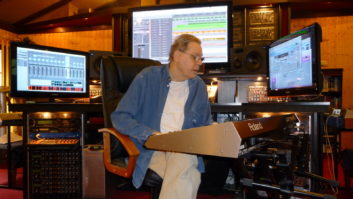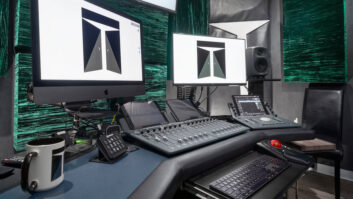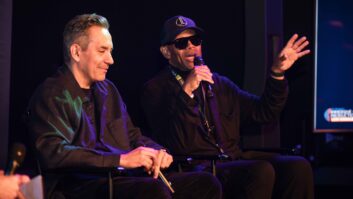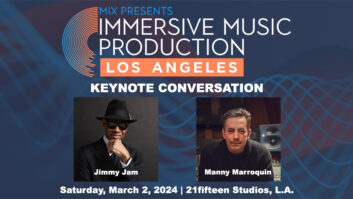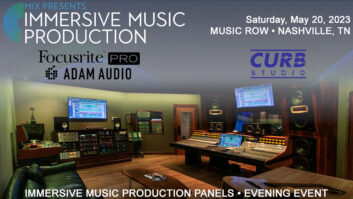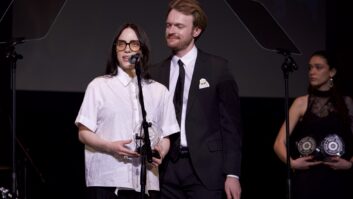It is no surprise that many of the best albums ever recorded have their roots in human challenges that are difficult to overcome: heartbreak, pain and loss. Will Sheff, the driving force and songwriter behind Okkervil River, certainly had his share of challenges with several personnel changes in his band and the recent loss of his grandfather. But Sheff kept his chin up and immersed himself in his work—and subsequently delivered Away, arguably one of the best albums of the year. Pro Sound News spoke with Sheff about staying focused on the project at hand and not missing a beat.
ON RHYTHMS OF AWAY:
When you have a really good rhythm section, you don’t have to turn it up in that modern way. On this record, the drums are rather quiet, but Culley’s [Simington] drumming informs the entire record because he is just so solid and has such a deep groove. He can play like a drum machine, but he also has so much beautiful human feeling to him and so much emotion and songwriting intelligence in the way that he plays. I kind of saw that in my head early on, and thought I would love to do something more acoustic and benefit from Culley’s playing. I had him for a week, so I thought I’d just try to write a whole record. I didn’t have a lot of money because I wasn’t even thinking that this was anything I would ever put out.
ON ASSEMBLING GREAT PLAYERS:
A big part of those classic, old singer/songwriter records was in addition to having all these great players, they also had these amazing consoles and mic cabinets—the best gear of the mid-70s at their disposal. I wanted to work at that kind of studio, but I didn’t really have that kind of cash. So I settled on this idea that if I could find the best musicians I could find, we wouldn’t have to fix anything. We’d just do it in first or second takes, and then we’ll do a live vocal. If there were mistakes in there, they will be musical mistakes—just like on your favorite records; great musicians doing the wrong thing, then course-correcting right in the moment in a very musical way. So it was like ‘the sky is the limit.’ You could go into a giant grocery store and get whatever you want from the whole store. It felt so alive and real and was something I needed to pursue. At that point, things really started rolling.
On First-Time Producing:
On this record, it was the first time I really produced by myself—I was free and could do whatever I wanted. I think I did a really great job, but I hadn’t learned a lot of the more cosmic, vibey things about producing; for example, how to not kill something. Slowly over time, I learned more and more, and eventually I figured out how to keep the life in something and how to not ruin things. For me, producing is really about how to keep the spirit in the recording, because I think so much of production is a million different opportunities to destroy something.
ON ‘BEAUTIFUL’ VS. ‘AUDIOPHILE’:
This is not that high fidelity of a record in my opinion. I think it sounds beautiful and it is my favorite sounding of all my records, but on a record like I Am Very Far, we were going for this audiophile thing. And when I listen back to a Neil Young record, they are not ‘audiophile records’—instead, they have nice, warm classic vibes from a time when this guy was still employing tons of expensive gear and really great players. So for Away, the focus ended up on being on the performances and on the songs. I just looked into myself and I said, “What do I want here?’ I found that the answer came quickly and wasn’t very complicated.
ON ‘COMES INDIANA THROUGH THE SMOKE’:
That song is about my grandfather. He was this big, larger than life figure, a big patriarch in my family. We had gotten closer and closer as he got older, and he was a tremendous supporter of my work. On that song, I was just writing these chords and this melody that was pretty, but I couldn’t really tell what I was writing about. But then it very slowly started to come into focus—I was literally seeing this ship coming out of the mist. I thought, Oh, I can just write a song about his ship. It suddenly became easy, because I already knew all this stuff. I just had to fit some facts about his life into this rhyme scheme and suddenly there was this song.
ON LYRICAL EXPERIMENTS:
For the last song on the album [“Days Spent Floating (In the Half-between)”], I would wake up in the morning and write down the first sentence that popped into my mind—and I wouldn’t look back. I was just slowly assembling one sentence a month. Then I sat down and literally set it down to two chords, and I was sort of thinking, ‘Is this any good?’ I didn’t really have time to tell at that point because we were literally tearing down the sessions and people were getting ready to leave the studio; everybody was really tired. So Will [Graefe, acoustic and electric lead guitar] and I sat in the lounge of the studio and over about four minutes, I just showed him the song and he wrote that beautiful hook. Then Noah [Garabedian], the bassist said, “I’ll do something on that.” We played it through once, and then Culley overdubbed his drums on it. That was the only time we ever played that song. Also, I kind of dropped the beat and lost my place in that song, but you can hear the other musicians just beautifully compensate for that and keep it flowing.
Jacques Sonyieux is a devout explorer of recording studios and the artists that occasionally inhabit them. Please send any tips or feedback to Jacques at: [email protected].
